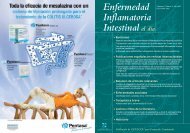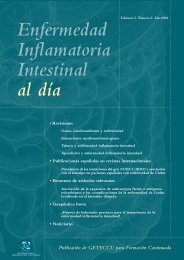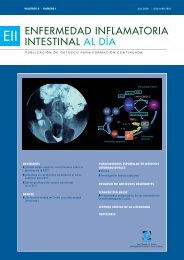Tabla III. Dosis, pauta y vía de administración de los distintos antiTNFα según la indicación en la ECEnfermedad lumin<strong>al</strong>Enfermedad fistulizanteInducción Mantenimiento Inducción MantenimientoInfliximab 5 mg/Kg/día iv: 5 mg/Kg/día 5 mg/Kg/día iv: 5 mg/Kg/díasemanas 0, 2 y 6. cada 8 semanas. semanas 0, 2 y 6. cada 8 semanas.Ad<strong>al</strong>imumab 160 mg sc** <strong>al</strong> inicio 40 mg sc cada 2 semanas Misma pauta que en Misma pauta que en80 mg a las 2 semanas enfermedad lumin<strong>al</strong> enfermedad lumin<strong>al</strong>(subanálisis del CHARM) según subanálisis del CHARMCertolizumab 400 mg sc <strong>al</strong> inicio 400 mg sc cada 4 No datos No datosy en la semana 2 semanas disponibles disponiblesEn caso de pérdida de respuesta o desarrollo de intolerancia, misma pauta según patrón enfermedad.¿Qué biológico debemos utilizar en laenfermedad de Crohn?Actu<strong>al</strong>mente sólo disponemos de 2 agentes biológicosautorizados para su uso en la EC; infliximab y ad<strong>al</strong>imumab.Certolizumab se acaba de autorizar por la FDA ydenegar por la EMEA, pero sí puede ser usado bajo usocompasivo en Europa. Aunque esto es básico en la prácticaa la hora de re<strong>al</strong>izar nuestra prescripción, estableceremosnuestras recomendaciones basadas esenci<strong>al</strong>menteen la evidencia, complementada en <strong>al</strong>gún momentopor nuestra opinión y experiencia. En la Tabla IIIse indica la dosis pauta y vía de administración de cadauno de los agentes anti-TNFα.Resumiendo lo expuesto previamente, la evidencia científicaactu<strong>al</strong> no permite establecer claras diferencias entrelos 3 anti-TNFα. En lo referente a la eficacia (esenci<strong>al</strong>para decidirnos por uno u otro biológico), aunqueno hay estudios que comparen un agente frente a otro,con los datos disponibles no podemos decir que ningunosea superior. Todos los ensayos con infliximab, ad<strong>al</strong>imumaby certolizumab pegol son ciegos, randomizadosy controlados con placebo, aunque su diseño varíaen <strong>al</strong>gunos aspectos relevantes. En primer lugar los pacientesincluidos son diferentes, esenci<strong>al</strong>mente en cuantoa haber recibido o no terapia anti-TNFα previa, estratificaciónpor PCR o por toma de inmunomoduladores.Además la forma de ev<strong>al</strong>uar la eficacia varía, en elmomento y en la forma, aunque todos incluyen la remisiónclínica como un punto fundament<strong>al</strong>. En cu<strong>al</strong>quiercaso, los datos de eficacia en enfermedad lumin<strong>al</strong> podemosdecir que son similares, tanto en la induccióncomo en el mantenimiento, para los tres agentes. En elcaso de la enfermedad fistulizante, tampoco podemosestablecer diferencias, pero sí hay que destacar que losdatos son mucho más abundantes para infliximab.En cuanto a la seguridad de estos agentes biológicostambién parece similar, en base a los resultados de losensayos clínicos. Dada la igu<strong>al</strong>dad en estos dos parámetrosesenci<strong>al</strong>es, otros aspectos, <strong>al</strong>gunos de ellos subjetivos,son importantes a la hora de optar por uno uotro agente anti-TNFα.Comparando los tres agentes, las ventajas de infliximabson la gran experiencia con su uso, que supone un mejorconocimiento de su perfil de seguridad <strong>al</strong> menos <strong>al</strong>argo plazo, su eficacia demostrada en la enfermedadfistulosa y que se asegura el cumplimiento, <strong>al</strong> ser administradopor vía endovenosa. Sus desventajas serían lateórica mayor inmunogenicidad y por supuesto el usopor vía intravenosa, con lo que supone para el paciente(desplazamientos innecesarios, pérdida de horas detrabajo) y para el hospit<strong>al</strong> (utilización de hospit<strong>al</strong> dedía). Con ad<strong>al</strong>imumab, la mayor ventaja sería el uso porvía subcutánea, con todo lo que ello implica (véase arriba).Su mayor desventaja es que disponemos de menosevidencia que demuestre su eficacia en la enfermedadfistulosa. En el caso de certolizumab, podríamos decirque ventajas y desventajas son análogas a ad<strong>al</strong>imumab,aunque con menos datos de momento. Nat<strong>al</strong>izumab podríaplantearse en fracasos de los otros biológicos enpacientes sin <strong>al</strong>ternativas quirúrgicas, con el riesgo deseguridad que ya hemos comentado.Concretando, las recomendaciones en los diferentesescenarios clínicos prácticos, podrían ser (Figura 1):• Enfermedad lumin<strong>al</strong>: tanto infliximab como ad<strong>al</strong>imumabserían igu<strong>al</strong>mente razonables. La preferenciadel paciente, correctamente informado de ventajasy desventajas de cada uno de ellos, es esenci<strong>al</strong>en la elección. Certolizumab también sería adecuado,pero no está disponible en la práctica como primeraopción.• Enfermedad fistulosa: la primera opción de momento,con los datos de que disponemos, es infliximab.Ad<strong>al</strong>imumab probablemente será también eficazy es una <strong>al</strong>ternativa en <strong>al</strong>gún paciente.• Pérdida de respuesta de infliximab o ad<strong>al</strong>imumab(tanto en enfermedad lumin<strong>al</strong> como fistulizante): enprimer lugar siempre deberíamos agotar las opcionesde ese agente para recuperarla (incremento dedosis o acortar interv<strong>al</strong>o). Si con ello no recuperamosla eficacia, antes de v<strong>al</strong>orar el cambio a otro biológico,debemos asegurarnos de que no hay otra causade refractariedad (especi<strong>al</strong>mente estenosis fibrosao absceso). Si el segundo biológico es eficaz perotambién la pierde con el tiempo, probablemente certolizumabes la mejor <strong>al</strong>ternativa.• Intolerancia a infliximab o ad<strong>al</strong>imumab: cambio <strong>al</strong>otro agente y si sucede fin<strong>al</strong>mente con los dos, cambioa certolizumab.160 • Enfermedad Inflamatoria Intestin<strong>al</strong> <strong>al</strong> día - Vol. 7 - Nº. 2 - 2008
RevisionesEnfermedad de CrohnIndicado tratamiento biológicoEnfermedad fistulosaEnfermedad lumin<strong>al</strong>1ª opción: infliximabAlternativa: ad<strong>al</strong>imumabEquiv<strong>al</strong>ente infliximab/ad<strong>al</strong>imumabRespuestaPierde respuestaIntoleranciaIncrementar dosis o acortar interv<strong>al</strong>o de agente utilizadoCambio de anti-TNF (ad<strong>al</strong>imumab por infliximab, y fin<strong>al</strong>mente por certolizumab)Recupera y mantiene eficaciaNo recupera o pierde nuevamente eficaciaConsiderar otra causa de refractariedadSí la hayNo la hayTratamiento específicoConsiderar cirugíaCambio de TNF (ad<strong>al</strong>imumab por infliximab, y fin<strong>al</strong>mente por certolizumab)Figura 1. Recomendaciones de uso de agentes biológicos en los diferentes escenarios clínicos prácticos, teniendo en cuenta la autorización actu<strong>al</strong>de la prescripción de los 3 anti-TNFα.BIBLIOGRAFÍA1. Munkholm P, Langholz E, Davidsen M, Binder V. Frequency of glucocorticoidresistance and dependency in Crohn’s disease. Gut 1994; 35:360–2.2. Candy S, Wright J, Gerber M, et <strong>al</strong>. A controlled double blind study ofazathioprine in the management of Crohn’s disease. Gut 1995; 37: 674–8.3. Travis SPL, Stange EF, Lemann M, et <strong>al</strong>. for the European Crohn’s and ColitisOrganisation (ECCO), European evidence based consensus on thediagnosis and management of Crohn’s disease: current management. Gut2006; 55 (Suppl. 1): i16–35.4. Sands BE, Arsenault JE, Rosen MJ, Alsahli M, Bailen L, Banks P et <strong>al</strong>. Riskof early surgery for Crohn’s disease: implications for early treatment strategies.Am J Gastroenterol 2003; 98: 2712–8.5. Wolters FL, Russel MG, Stockbrugger RW. Systematic review: has diseaseoutcome in Crohn’s disease changed during the last four decades? AlimentPharmacol Ther 2004; 20: 483–96.6. American Gastroenterologic<strong>al</strong> Association Consensus Development Conferenceon the Use of Biologics in the Treatment of Inflammatory BowelDisease, June 21–23, 2006. Gastroenterology 2007; 133: 312–39.7. Domènech E, Esteve M, Gomollón F, Hinojosa J, Panés J, Obrador A, GassullMA; Grupo Español de Trabajo en Enfermedad de Crohn y Colitis Ulcerosa.GETECCU-2005 recommendations for the use of infliximab (Remicade) ininflammatory bowel disease. Gastroenterol Hepatol. 2005; 28: 126-34.8. Baert FJ, D´Haens GR, Peeters M, Hiele MI, Schaible TF, She<strong>al</strong>y D y cols.Tmor necrosis factor <strong>al</strong>pha antoibody (infliximab) therapy profoundlydown-regulates the inflammation in Crohn´s ileocolitis. Gastroenterology1999; 116: 22-8.9. Fossati G, Nesbitt AM. IN vitro complement-dependent cytotoxicity andantibody-dependent cellular cytotoxicity by the anti TNF agents ad<strong>al</strong>imumab,etanercept, infliximab and certolizumab pegol (CDP 870). Am J Gastroenterol2005; 100 (Supl 9): S 299 (abstract 807).10. Nesbitt A, Fossati G, Bergin M, Stephens P, Stephens S, Foulkes R, BrownD, Robinson M, Bourne T. Mechanism of action of certolizumab pegol(CDP870): in vitro comparison with other anti-tumor necrosis factor <strong>al</strong>phaagents. Inflamm Bowel Dis. 2007; 13: 1323-32.11. Targan SR, Hanauer SB, van Deventer SJ, Mayer L, Present DH, BraakmanT, et <strong>al</strong>. A short-term study of chimeric monoclon<strong>al</strong> antibody cA2 to tumornecrosis factor <strong>al</strong>pha for Crohn's disease. Crohn's Disease cA2 StudyGroup. N Engl J Med 1997; 337:1029-35.12. Hanauer SB, Feagan BG, Lichtenstein GR, Mayer LF, Schreiber S, ColombelJF, et <strong>al</strong>. Maintenance infliximab for Crohn's disease: the ACCENT Irandomised tri<strong>al</strong>. Lancet 2002; 359:1541-9.13. Rutgeers P, D´Haens G, Targan S y cols. Efficacy and safety of retreatmentwith anti-tumor necrosis antibody (infliximab) to maintain remission inCrohn´s disease. Gastroenterology 1999; 117: 761-9.14. Present DH, Rutgeers P, Targan S y cols. Infliximab for the treatment of fistulasin patients with Crohn´s disease. N Engl J Med 1999; 340: 1398-405.15. Sands BE, Anderson FH, Bernstein CN, Chey WY, Feagan BG, Fedorak RN,Kamm MA, Korzenik JR, Lashner BA, Onken JE, Rachmilewitz D, Rutge-161 • Enfermedad Inflamatoria Intestin<strong>al</strong> <strong>al</strong> día - Vol. 7 - Nº. 2 - 2008











